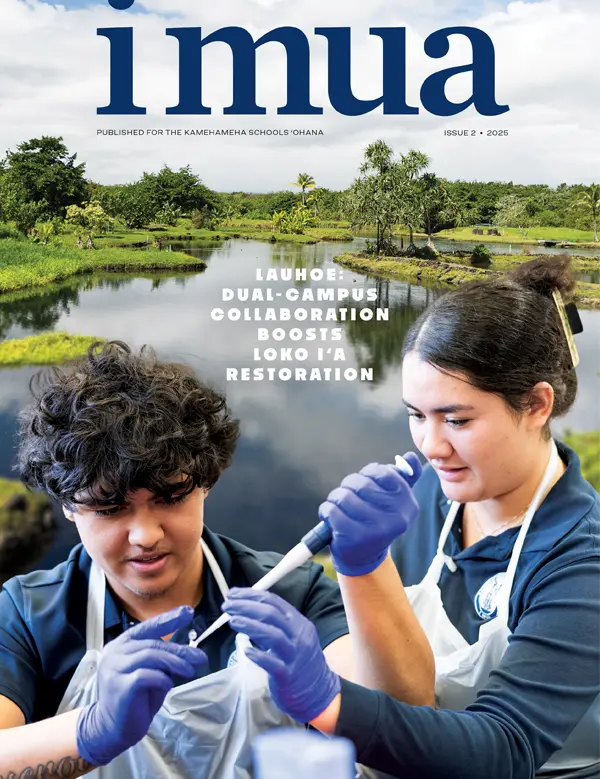Kamehameha Schools Urge Court to Affirm Admissions Plan
June 20, 2006
Contributed by
Thomas Yoshida
Appearing before a 15-judge panel of the 9th U.S. Circuit Court of Appeals, the schools' lawyer, Kathleen M. Sullivan, said the court should affirm the November 2003 ruling by U.S. District Court Judge Alan Kay in Honolulu that found that Kamehameha's policy served a "legitimate remedial purpose." A decision is not expected for months.
"The harm and devastation to Native Hawaiians has been unique," Sullivan told the court during the 75-minute hearing. Kamehameha's policy is legally justified and is "reasonably related to a legitimate remedial purpose."
Calling it a "jewel of the Native Hawaiian people," she said Kamehameha provides children with the skills and educational opportunities they need "to lift up the Hawaiian people from degradation" and to create future leaders for society. The policy is "entirely legal under our civil rights laws because it addresses the continuing harms from a legacy of devastation," Sullivan said after the hearing.
In urging the panel to affirm district court decision, Sullivan noted that Judge Kay in his decision recognized that the U.S. Congress has acknowledged the existence of a special trust relationship with Native Hawaiians by enacting more than 80 federal statutes that provide funding for programs that promote the well- being of Hawaiians.
Chairman Robert Kihune and the four other members of Kamehameha Schools' Board of Trustees attended the hearing in San Francisco, including Vice Chairman J. Douglas Ing, Constance Lau, Diane Plotts and Nainoa Thompson. Also in the courtroom were the Schools' chief executive officer, Dee Jay Mailer, President and Kapalama Headmaster Michael Chun and Colleen Wong, vice president, legal services.
"We are fighting for the future of our people – and for the health and well-being of the entire state," explained Kihune. "This case is about providing educational opportunities that improve the lives of Native Hawaiians and protect and preserve our culture."
Kihune said the schools' admissions policy "was critical to our ability to finish the work envisioned by Princess Bernice Pauahi Bishop in 1884, when she left her estate to establish Kamehameha Schools for the benefit of her people." While many of Kamehameha's 20,000 graduates have become leaders in all aspects of Hawaiian life over the past 119 years, "the undisputed fact is that thousands of Native Hawaiians still need the educational opportunities provided by the princess' Trust," Kihune said.
Said CEO Mailer: "We came here today backed by the good wishes and support of people throughout Hawaii who understand that we all benefit from a strong Hawaiian culture and community. If our policy is overturned, it will hurt the children who need this remedy the most and for whom it was intended."
"We pray that the appeals court judges who heard the case today understand our unique history and needs and will agree with Judge Kay that our policy is valid and must be allowed to stand if Kamehameha is to fulfill its important mission of giving Hawaiian children an even chance at success," Mailer said.
About the Litigation:
Doe vs. Kamehameha Schools was filed in Honolulu in June 2003 by an unidentified student known as John Doe. In a 2-1 decision last August, a three-judge panel of the U.S. Court of Appeals in San Francisco overturned Judge Kay's ruling upholding the admissions policy. That decision was vacated earlier this year when the 9th Circuit Court of Appeals agreed to rehear the case en banc, which led to today's hearing before the 15-judge panel.
About Kamehameha Schools:
Kamehameha currently serves 5,400 students of Hawaiian ancestry at K-12 campuses on three islands. Thousands of Hawaiians and non-Hawaiian children also attend 33 pre-schools and participate in numerous educational outreach programs sponsored by Kamehameha throughout the state. The schools' entire $225 million annual education budget is funded by revenue generated by Princess Bernice Pauahi Bishop's estate. Kamehameha opened as The Kamehameha School for Boys in 1887, three years after the princess' death. Its policy of giving admissions preference to Hawaiian applicants was adopted by the first board of Trustees, led by Pauahi's widower, Charles Reed Bishop.
######











